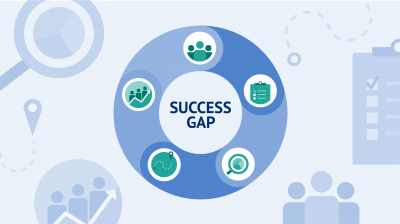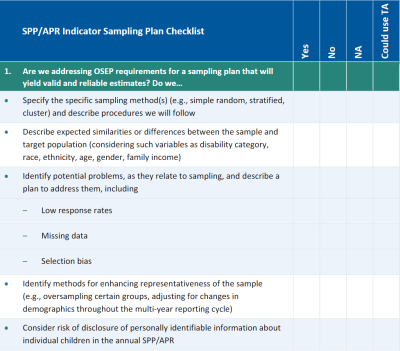
Resource Library
Guides. Briefs. Toolkits. Quick reference information. IDC and its partners created these data quality resources to help states better prepare to address their existing or emerging IDEA data quality needs. Use our search and filtering tools to navigate the library.
Resources 8 - 14 of 88
Format: Guides and Briefs
Success Gaps Rubric: Addressing Equity, Inclusion, and OpportunityThis rubric allows a team of users from a district or school to systematically examine the root causes of success gaps among groups of students by focusing on equity, inclusion, and opportunity. The recently updated rubric now includes considerations for children as young as preschool age. A complementary white paper provided the research-based background that supported development of the rubric.
Format: Guides and Briefs
Statewide Assessment: Indicator 3 Measurement Changes From FFY 2019 to FFY 2020–2025This resource offers a side-by-side comparison of the SPP/APR Part B indicator measurement tables for FFY 2019 and FFY 2020 to highlight new SPP/APR reporting requirements and measurement changes to Indicator 3. The majority of students with disabilities participate in regular statewide assessments, and a small percentage of students with the most significant disabilities participate in alternate assessments. In FFY 2020, OSEP requires states to disaggregate statewide assessment results for these two groups of students with disabilities (i.e., those who participate in the regular assessment and those who participate in the alternate assessment). OSEP also requires states to calculate a “proficiency rate gap” between students with and without disabilities who participate in the regular statewide assessment.
Format: Guides and Briefs
State Determinations of Local Education Agency (LEA) PerformanceThis resource provides a summary of findings from 28 states’ publicly available LEA determinations processes. States can use this resource to learn more about the data elements, calculation methodologies, and determination category criteria these 28 states used for making LEA determinations. This information can be particularly valuable for those states considering revisions and updates to their own LEA determinations processes.
The SPP/APR Target Setting Toolkit is a series of eight Excel workbooks designed to assist states as they set targets for their State Performance Plan/Annual Performance Report (SPP/APR). Each tool presents five different target setting methodologies that states can use to develop, discuss, and, ultimately, set measurable and rigorous targets, as required by the Individuals with Disabilities Education Act (IDEA).
The following is a list of IDC resources that states can use to support their understanding and actions related to the FFY 2020–2025 Part B SPP/APR. States can use the resources to improve communication about the FFY 2020–2025 SPP/APR requirements and encourage increased engagement among state staff and stakeholders related to SPP/APR planning and implementation.
Format: Quick Reference
SPP/APR Indicator Sampling Plan ChecklistStates are allowed to use sampling for collecting data for select Part B State Performance Plan/Annual Performance Report indicators. Sampling can provide an effective means for targeting resources for data collection and improving data quality. However, there are important requirements that states must consider when designing and implementing their sampling plans. States can use this interactive self-assessment tool to determine whether their state’s sampling plan addresses Office of Special Education Programs sampling requirements for best practice and to identify action steps to improve their sampling procedures.
Format: Quick Reference
SPP/APR Indicator CardThe SPP/APR indicators measure child and family outcomes as well as compliance with the requirements of IDEA. This quick-reference resource from IDC includes a list and brief definition of all the Part B FFY 2020–2025 SPP/APR indicators (including the new Indicator 18!), as well as a list of file specifications associated with each of the seven IDEA 618 data collections, all in one convenient package. Print one out here or contact your IDC State Liaison for a laminated version you can carry along wherever you go.








